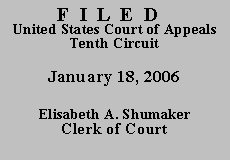

| MICHAEL HAYWARD,
Plaintiff-Appellant,
v.
WARDEN BRILL, Warden; N.P.
WEDERSKI; N.P. HILL Defendants-Appellees. |
No. 04-1520
(D.C. No. 04-Z-1328) (Colorado) |
The Prison Litigation Reform Act (PLRA) commands that "[n]o action shall be brought with respect to prison conditions under section 1983 of this title, or any other Federal law, by a prisoner confined in any jail, prison, or other correctional facility until such administrative remedies as are available are exhausted." 42 U.S.C. § 1997e(a). In his complaint, Mr. Hayward acknowledged he had not exhausted administrative remedies. The district court issued a show cause order, noting that pursuant to Steele v. Fed. Bureau of Prisons, 355 F.3d 1204, 1210 (10th Cir. 2003), Mr. Hayward was not only required to exhaust his available remedies prior to bringing his § 1983 suit but was also required to provide supporting information with the complaint as evidence of exhaustion. Because Mr. Hayward failed to do either, the court ordered him to explain why his complaint should not be dismissed for failure to exhaust administrative remedies. In response, Mr. Hayward indicated that two days before filing his show cause answer, he filed a final step three grievance with the prison and was awaiting a response. He requested the court to grant him an extension so he could exhaust his remedies and proceed with his case. The court denied his request and dismissed the action without prejudice.
We can not say the district court erred in dismissing Mr. Hayward's case. "[The PLRA's] statutory exhaustion requirement . . . is mandatory, and the district court was not authorized to dispense with it." Beaudry v. Corr. Corp. of Am., 331 F.3d 1164, 1168 n.5 (10th Cir. 2003). If Mr. Hayward has indeed exhausted his administrative remedies, he may be entitled to file another complaint. But any present status of exhaustion does not undermine Mr. Hayward's own concession that he had not exhausted his administrative remedies prior to filing his initial action. See McKinney v. Carey, 311 F.3d 1198, 1199 (9th Cir. 2002) ("§ 1997e(a) requires exhaustion before the filing of a complaint and . . . a prisoner does not comply with this requirement by exhausting available remedies during the course of the litigation") (citing cases).
We GRANT Mr. Hayward's request to proceed in forma pauperis on appeal and AFFIRM.
ENTERED FOR THE COURT
Stephanie K. Seymour
Circuit Judge
*.After examining appellant's brief and the appellate record, this panel has determined unanimously that oral argument would not materially assist the determination of this appeal. See Fed. R. App. P. 34(a)(2) and 10th Cir. R. 34.1(G). The case is therefore submitted without oral argument. This order and judgment is not binding precedent, except under the doctrines of law of the case, res judicata, or collateral estoppel. The court generally disfavors the citation of orders and judgments; nevertheless, an order and judgment may be cited under the terms and conditions of 10th Cir. R. 36.3.
1.Mr. Hayward was incarcerated when he initially filed this action, but he was released shortly after initiating this appeal. Because he is proceeding pro se, we construe his pleadings liberally. Haines v. Kerner, 404 U.S. 519, 520-21 (1972); Hall v. Bellmon, 935 F.2d 1106, 1110 (10th Cir. 1991).